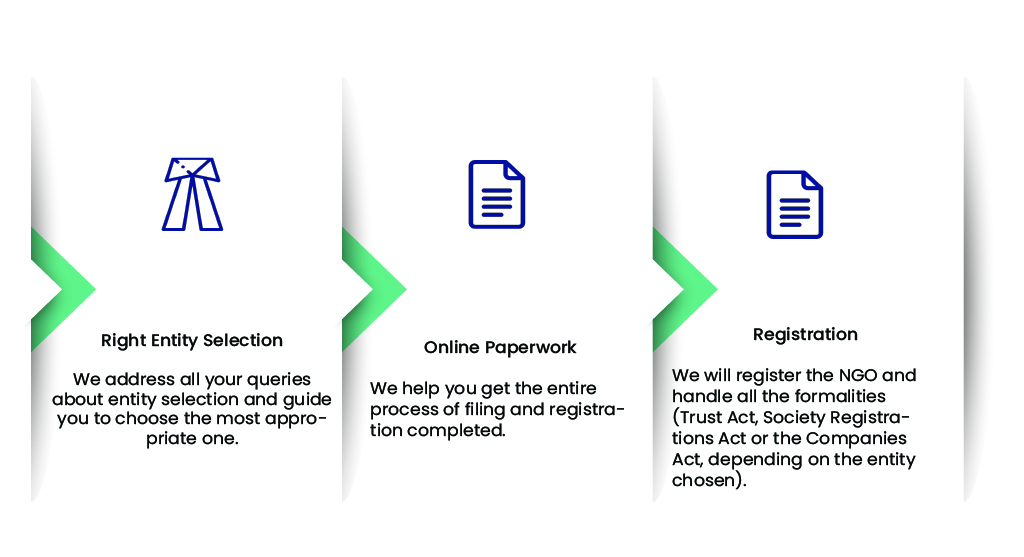
NGO Registration Under Section 80G & Section 12A
NGOs are established for good causes, and the government provides tax exemptions to assist them with raising funds. Now is the time to register your NGO under Sections 80G and 12A in order to avail of those benefits for your NGO.
Registration Starting at Just ₹45,000/- (Inclusive of all Govt. Fees)
How Does NGO Registration Work For You?
Societies Registration Act, or as a Section 8 company under the Companies Act, 2013.

Under Section 80G & Section 12A

Documents Required from Directors, Shareholders
- Pan Card Copy (Mandatory)
- ID Proof (Any one) – Driving License/ Voter ID/ Passport Copy/ Aadhaar Card
- Address Proof – Latest Bank Statement/ Latest Telephone or Mobile Bill/ Latest Electricity Bill.(MUST be less than 30 days old)
- Passport Size Photograph

Documents Required for Registered Office Address
- NOC – No Objection Certificate from the Owner of the Property
- Address Proof – Latest Telephone Bill or Mobile Bill/ Gas Bill/ Electricity Bill (MUST be less than 30 days old)
Introduction
NGOs primarily rely on donations to support their functioning. To claim those tax exemptions (available to both donors and recipients), NGOs are to register under Section 80G and Section 12A of the Income Tax Act. The process is complicated and time-consuming, and it can be difficult for non-professionals to do it.
Moreover, recent changes have mandated that all the NGOs who have already registered under these 2 sections re-register under sections 80G and 12A to continue enjoying those tax benefits. Further, if an NGO seeks CSR funding, they are required to register using Form CSR-1.
Re-validation Under Sections 12A and 80G
Time Taken:
The overall process may take up to three months, where the application shall be made within 1 week from the date of submission of documents. It holds a 5-year validity and requires renewal every 5 years.
Documents Required:
- Registered trust deed/society registration certificate/incorporation certificate
- Self-certified copies of audited annual accounts for the preceding three financial years
- NGO DARPAN ID (if receiving government grants)
- FCRA ID (if receiving foreign donations)
- Self-certified copy of the certification previously obtained under 12A and 80G
- A note on the activities of the applicant.
Registration Under 12A:
As registration under Section 12A is for tax exemption, an NGO which has not registered under this cannot enjoy the privilege of tax exemption and would have to pay taxes just as any normal registered company would during the year.
How to Register Under Section 12A
All charitable trusts, societies, and Section 8 Companies, except private or family trusts, are eligible to register under Section 12A. But, before registration under 12A and 80G, an NGO has to first register with NGO Darpan, a register maintained by the Government of India, and then be registered under the Income Tax Act (This is not compulsory, it is an option available to trusts. A charitable organisation without Darpan can also apply for 12A and 80G) by following the steps mentioned below.
Step 1: An application has to be filed in Form 10A with the Commissioner of Income Tax – Exemption
Step 2: The required documents need to be submitted
Step 3: Once the documents are submitted, the application will be reviewed by the Commissioner, who might ask for additional information
Step 4: If everything is found to be satisfactory, the registration will be completed soon after, else it will be rejected.
Benefits:
- Provision to gain grants from governments and international organisations.
- Registration certificate serves as valid proof of the purpose of the NGO and its operations.
- All NGOs, be they trusts, companies, or societies, are eligible to avail exclusion from taxes
- FCRA registration benefits.
As registration under Section 12A is for tax exemption, an NGO which has not registered under this cannot enjoy the privilege of tax exemption and would have to pay taxes just as any normal registered company would during the year.
How to Register Under Section 12A
All charitable trusts, societies, and Section 8 Companies, except private or family trusts, are eligible to register under Section 12A. But, before registration under 12A and 80G, an NGO has to first register with NGO Darpan, a register maintained by the Government of India, and then be registered under the Income Tax Act (This is not compulsory, it is an option available to trusts. A charitable organisation without Darpan can also apply for 12A and 80G) by following the steps mentioned below.
Step 1: An application has to be filed in Form 10A with the Commissioner of Income Tax – Exemption
Step 2: The required documents need to be submitted
Step 3: Once the documents are submitted, the application will be reviewed by the Commissioner, who might ask for additional information
Step 4: If everything is found to be satisfactory, the registration will be completed soon after, else it will be rejected.
Benefits:
- Provision to gain grants from governments and international organisations.
- Registration certificate serves as valid proof of the purpose of the NGO and its operations.
- All NGOs, be they trusts, companies, or societies, are eligible to avail exclusion from taxes
- FCRA registration benefits.
Registration Under 80G:
As per Section 80G of the Income Tax Act, if an NGO gets an 80G certification then it’s donors will be allowed to reduce the amount of donation made from its total Income (proportion of deduction allowed depends on the type of organisation), thus being incentivised to contribute some part of their disposable income towards good causes.
How to Register Under Section 80G
Any NGO that wants to register under Section 80G has to be duly registered and should be working specifically towards charitable objectives.
Step 1: An application has to be filed in Form 10A with the Commissioner of Income Tax – Exemption.
Step 2: Important documents are to be submitted
Step 3: Upon submission, the documents would be reviewed by the Commissioner. If required, he may ask for additional documents or information and the same have to be provided within the timeframe to avoid rejection
Benefits:
- 80G certification enhances the prospects and credibility of any organisation
- Donors reap the benefits of less taxable incomes
- Possibility of attracting more donors
- Eligibility to get government funds
- NGO owners can seek foreign contributions without many hassles
New terms of Registration and Re-registration under Section 80G and 12A
- Newly established trusts applying for income tax registration will be given provisional registration for three years. It becomes due for renewal either upon commencement of activities or upon completion of 3 years.
- For Re-Registration, the tenure will be revalidated by income tax authorities for a period of 5 years and renewal will fall due upon completion of 5 years.
Why Finnsdom?
- Our CA/CS will fill out the application and submit it on your behalf
- We guide you through the entire process
- You just need to share your IT login credentials to start the application process
- Finnsdom has the experience of working with thousands of NGOs and understands the needs of such organisations
Get Started at
₹ 499/-
FAQs on NGO Registration Under Section 80G & Section 12A
For new 12A and 80G registrations, they can be filed immediately upon incorporation.
The process is 100% online. So, it doesn’t require your physical presence at any stage. Relax in the comfort of your home while we take care of everything.
All government-approved organizations and trusts are eligible for 80G registration. To check, visit www.incometaxindia.gov.in and check for your organization/trust.
We can apply for 12A and 80G soon after the Trust is registered. If in case the customer is applying after a year or two then their ITR is required.
Yes, you can apply for them separately in which case you have to apply for 12A first. However, doing them together is easier.
Earlier, 80G and 12A registrations were valid for the lifetime of an organisation. Now, in the case of provisional registration, the validity of 80G and 12A registrations has been kept at 3 years, or for 3 years from the commencement of activities, whichever is earlier and, in case of re-validation, the validity is 5 years.

